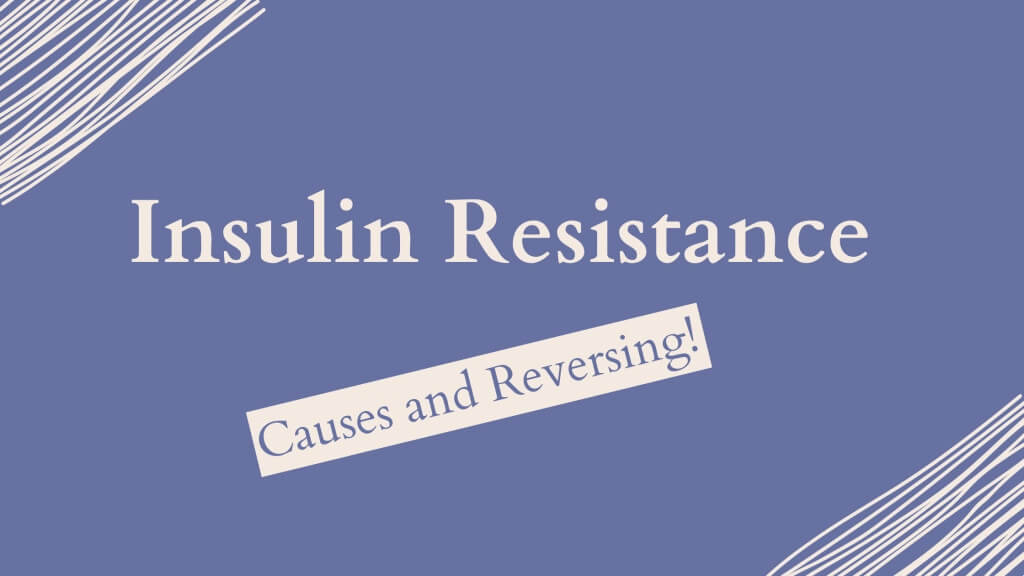
Healthy metabolic function requires a balance of building up and breaking down – to use stored fuels and to remove old, worn-out cells. When insulin levels are consistently elevated, certain cells can become resistant to insulin’s effects. This insulin resistance is therefore made up of two distinct features – elevated insulin levels and reduced effect of the insulin at the cell.
Let’s back up a bit to why insulin would be elevated. There are three primary mechanisms that lead to elevated insulin and ultimately insulin resistance. Lets start with least impactful and move to the most impactful.
- Stress. Cortisol and other related stress hormones directly antagonize insulin. This can rapidly cause insulin resistance by impeding insulin’s function. Now, this doesn’t have to be major stress. Even short-term sleep deprivation can cause a spike in cortisol leading to insulin resistance. Managing stress has tremendous impacts on every aspect of your health.
- Inflammation. Research has shown that when inflammatory compounds are given to animals or humans, insulin resistance occurs immediately. Inflammation can stem from underlying conditions, toxin exposures, poor diet, nutrient deficiencies, and poor stress management. Reducing your inflammatory load can help reverse any insulin resistance you may have.
- Diet – specifically refined carbohydrates. This isn’t an anti-carb message. I do not believe we need to restrictively avoid all carbs – but there’s a significant difference between a whole, naturally derived starch or carbohydrate and a refined grain or sugar. Simple carbs, refined grains, and a high intake of carbohydrates cause large spikes in blood sugar and therefore high levels of insulin. These foods are not well satiating, and they don’t last very long – so you end up eating more often, keeping those insulin levels elevated. Chronic elevation of insulin directly and severely contributes to insulin resistance.
One more mechanism that I really have to mention here is the excessive consumption of a specific type of fat – namely linoleic acid. This is now the most commonly consumed fat in the standard American diet due to the significant increase in the use of refined cooking oils like canola, corn, and soybean. Linoleic acid directly causes fat cells to become insulin resistant by changing the way the fat cells grow. If you read labels carefully, most packaged foods contain these oils. Sadly, most restaurants use these oils exclusively, too. When it comes to healthy fat consumption, you really want to lean more into quality, unrefined fats from animal or plant sources.

So, what do we do about insulin resistance?
- Diet. Control carbohydrate intake and make them whole, natural carbs (like sweet potato, whole fruit, and vegetables). Prioritize quality protein. Animal proteins are the most bioavailable, but many plants can also provide protein. Fill and flavor with fat. We don’t necessarily need to eat a high-fat diet, but fat makes us feel full, satisfied and makes our food flavorful. Choose wisely!
- Exercise. Any exercise you will do will help! Specifically, resistance and HIIT style workouts have been shown to help reverse insulin resistance – of course, this only works in the context of a healthy diet! You can’t exercise your way out of insulin resistance while shoveling in refined carbs and poor-quality fats.
- Lifestyle. Removing toxins and inflammatory substances, reducing and managing stress, and emphasizing sufficient quality sleep all play a role in managing your insulin levels and reversing insulin resistance.
So now you know more about insulin! It’s not simply a hormone that manages blood sugar – but actually plays significant roles throughout the body. Blood sugar and insulin management is a primary focus in Nutrition Therapy – it’s THAT important!




















0 Comments